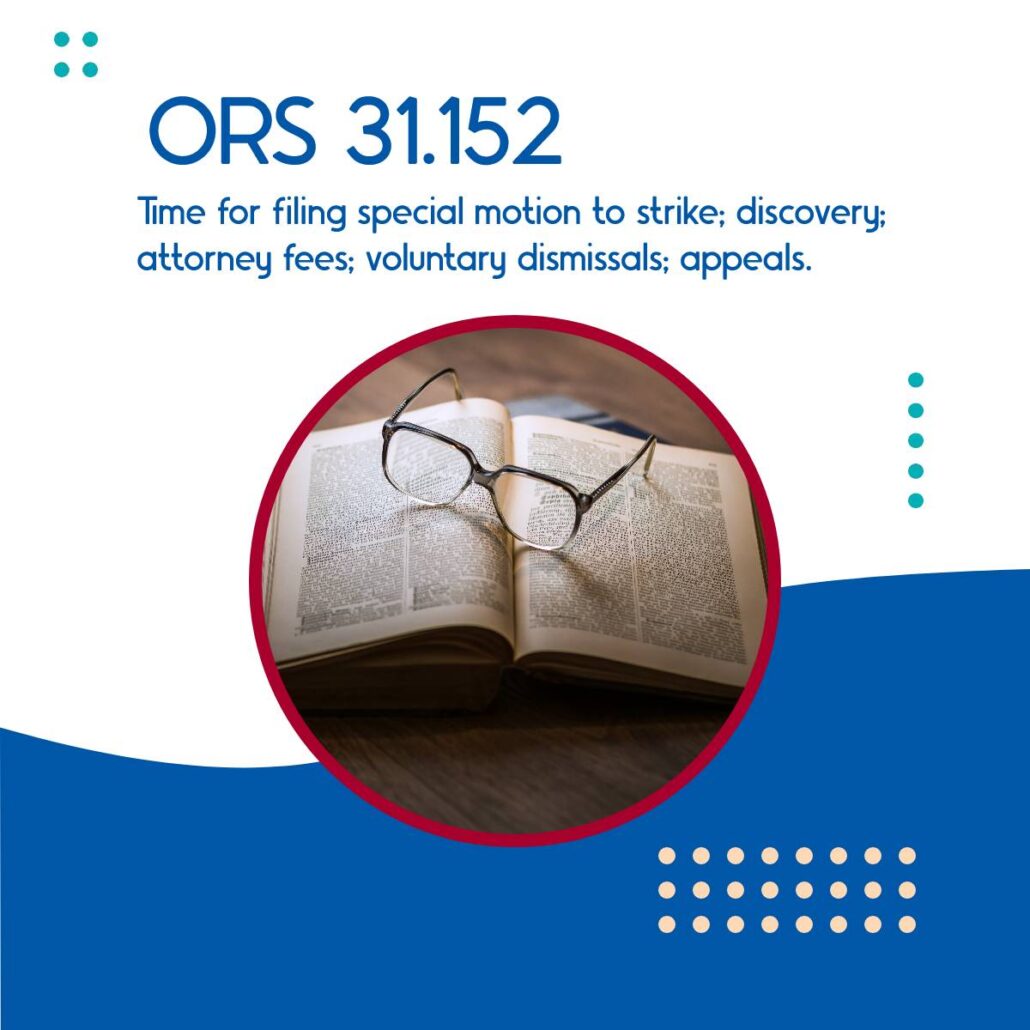ORS 31.152
ORS 31.152 is an Oregon law that allows defendants to file a special motion to strike in tort cases. This motion can be used to dismiss lawsuits based on protected speech or petition activities. A special motion to strike is a legal procedure that allows a defendant to ask the court to dismiss a lawsuit based on the pleadings alone, without any discovery or trial.
Note: It's important to remember that this doesn't capture the full nuances of the statute. If you have a specific legal question or situation related to ORS 31.152 call for a free personal injury consultation.

Here are the key provisions of ORS 31.152:
- Time limit: A special motion to strike must be filed within 60 days after the service of the complaint.
- Discovery stay: All discovery in the proceeding is stayed upon the filing of a special motion to strike. The stay remains in effect until the court rules on the motion.
- Attorney fees: The prevailing party on a special motion to strike is entitled to attorney fees.
ORS 31.152 is intended to provide defendants with a way to quickly and cheaply get rid of lawsuits that are based on frivolous or meritless claims. It can also be used to strike claims that are barred by the statute of limitations or that are preempted by federal law.
ORS 31.152 Text
31.152 Time for filing special motion to strike; discovery; attorney fees; voluntary dismissals; appeals. (1) A special motion to strike under ORS 31.150 must be filed within 60 days after the service of the complaint or, in the court’s discretion, at any later time. A hearing shall be held on the motion not more than 30 days after the filing of the motion unless the docket conditions of the court require a later hearing.
(2)(a) All discovery in the proceeding shall be stayed upon the filing of a special motion to strike under ORS 31.150. The stay of discovery shall remain in effect until entry of the judgment. The court, on motion and for good cause shown, may order that specified discovery be conducted notwithstanding the stay imposed by this subsection.
(b) During a stay under this subsection, the court may hear and rule on a motion for reasonable attorney fees and costs under subsection (3) of this section.
(c) A stay under this subsection does not affect a party’s ability voluntarily to dismiss a claim or part of a claim or move to sever a claim.
(d) During a stay under this subsection, the court for good cause may hear and rule on:
(A) A motion unrelated to the special motion to strike under ORS 31.150.
(B) A motion seeking a preliminary injunction to protect against an imminent threat to public health or safety.
(3) A defendant who prevails on a special motion to strike made under ORS 31.150 shall be awarded reasonable attorney fees and costs. If the court finds that a special motion to strike is frivolous or is solely intended to cause unnecessary delay, the court shall award costs and reasonable attorney fees to a plaintiff who prevails on a special motion to strike.
(4)(a) A voluntary dismissal without prejudice of a responding party’s claim, or part of a claim, that is the subject of a special motion to strike under ORS 31.150 does not affect a moving party’s right to obtain a ruling on the motion and seek attorney fees and costs under subsection (3) of this section.
(b) A voluntary dismissal with prejudice of a responding party’s claim, or part of a claim, that is the subject of a special motion to strike under ORS 31.150 establishes for the purpose of subsection (3) of this section that the moving party prevailed on the motion.
(5) A moving party may appeal as a matter of right from an order denying, in whole or in part, a special motion to strike under ORS 31.150. The appeal must be filed in accordance with ORS 19.205.
(6) The purpose of the procedure established by this section and ORS 31.150 and 31.155 is to provide a defendant with the right to not proceed to trial in cases in which the plaintiff does not meet the burden specified in ORS 31.150 (4). This section and ORS 31.150 and 31.155 are to be liberally construed in favor of the exercise of the rights described in ORS 31.150 (2). [Formerly 30.144; 2009 c.449 §3; 2023 c.71 §2]
https://www.oregonlegislature.gov/bills_laws/ors/ors031.html
How Does ORS 31.152 Work?
- Defendants file a motion: If a claim seems based on protected speech or petition activities, the defendant can ask the judge to dismiss it.
- Time limit: This motion must be filed within 60 days of receiving the complaint, but the judge can extend this deadline for good reason.
- Discovery pause: Once the motion is filed, all information gathering (discovery) is automatically stopped until the judge decides.
- Burden of proof: The defendant first shows the claim likely arose from protected activity. Then, the plaintiff must prove they can still win despite this.
- Judge decides: If the plaintiff proves likely success, the claim stays. If not, it's dismissed without prejudice (meaning the plaintiff can try again differently).
- Costs and fees: The winning party (defendant or plaintiff) may be awarded attorney fees, depending on the circumstances.
Key points:
- Protects defendants from unnecessary trials in certain cases.
- Fast and early way to dismiss claims based on free speech and petition rights.
- Burden of proof shifts between defendant and plaintiff.
- Discovery is automatically paused while the judge decides.
- Costs and fees may be awarded to the winning party.
ORS 31.XXX
This post is part of our series of posts on ORS chapter 31 in general. We have more information available about ORS chapter 31 in addition to detailed dives into other sections of the chapter.
We will review your case for free.
Pay us nothing unless we get you a better settlement.
We work on contingency.

